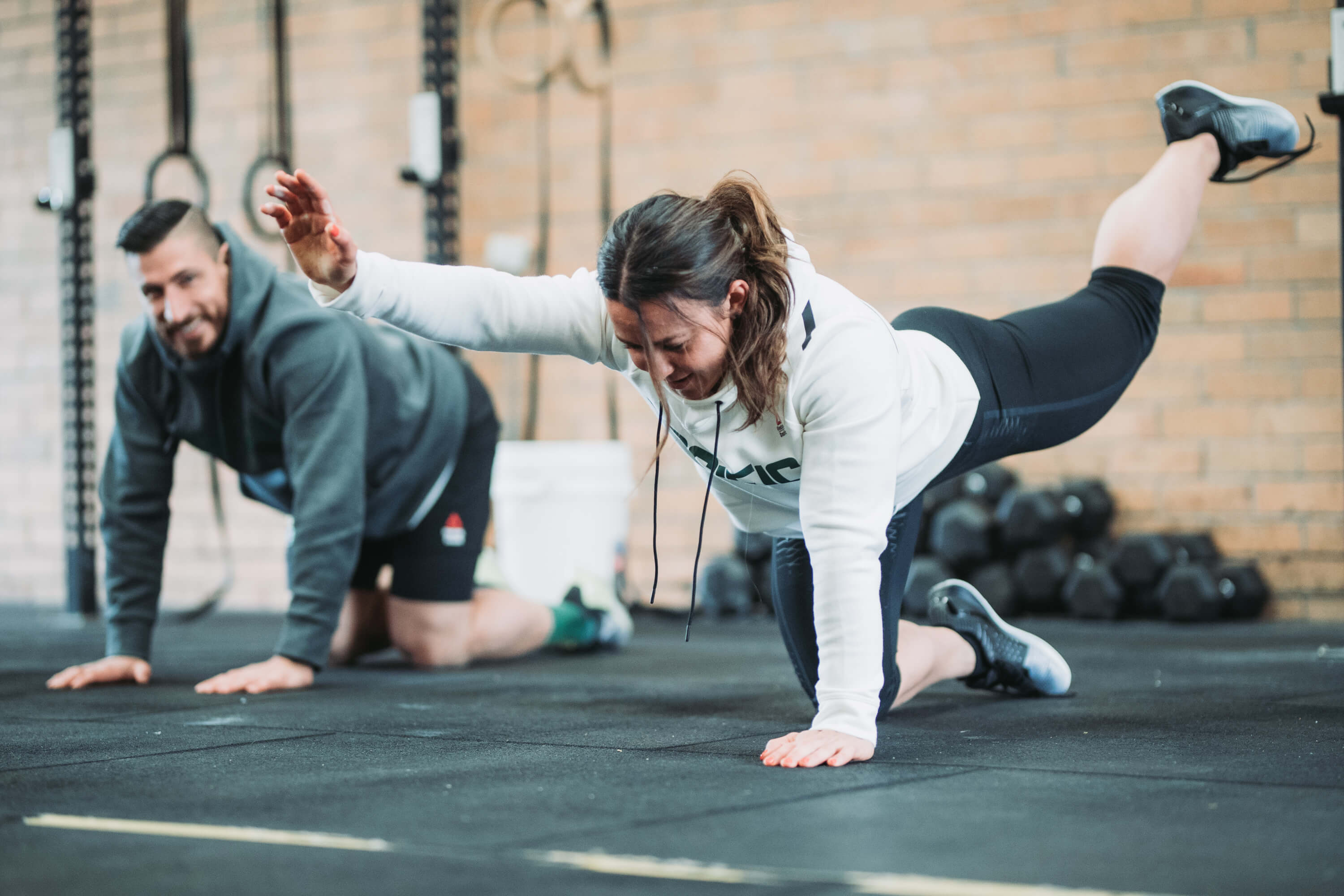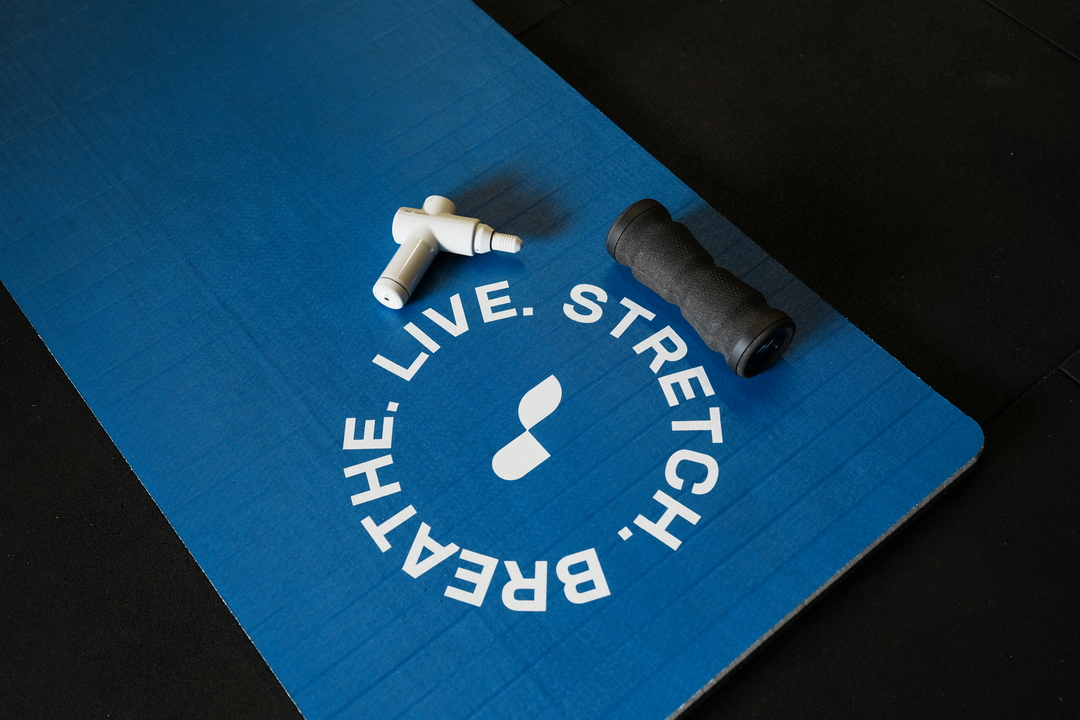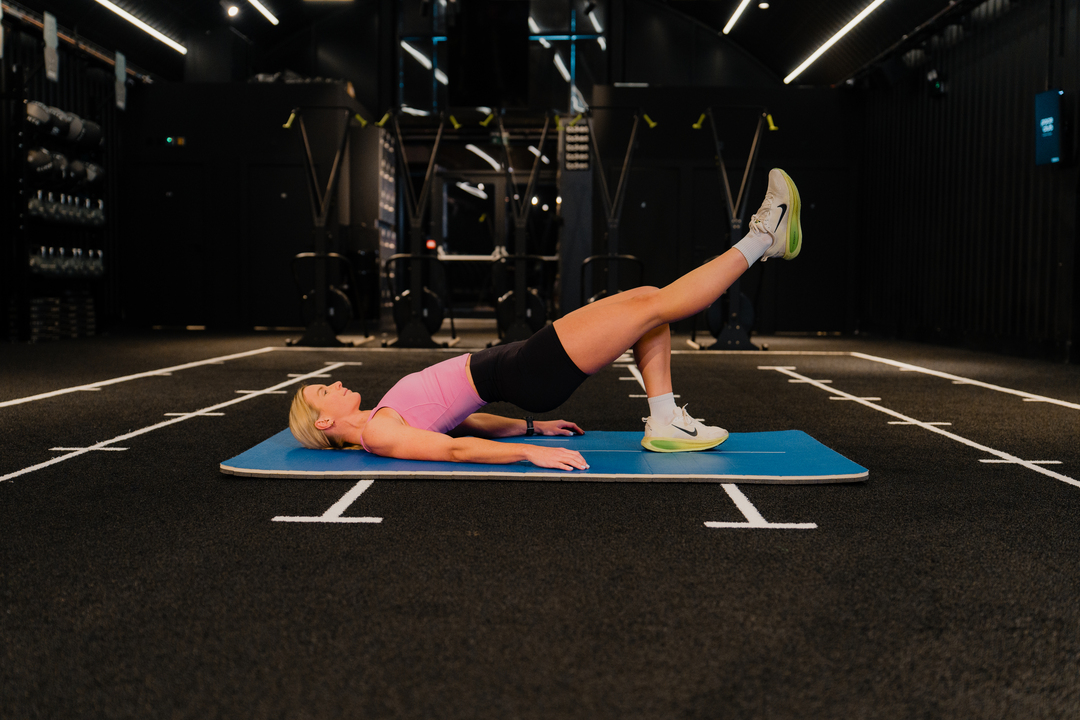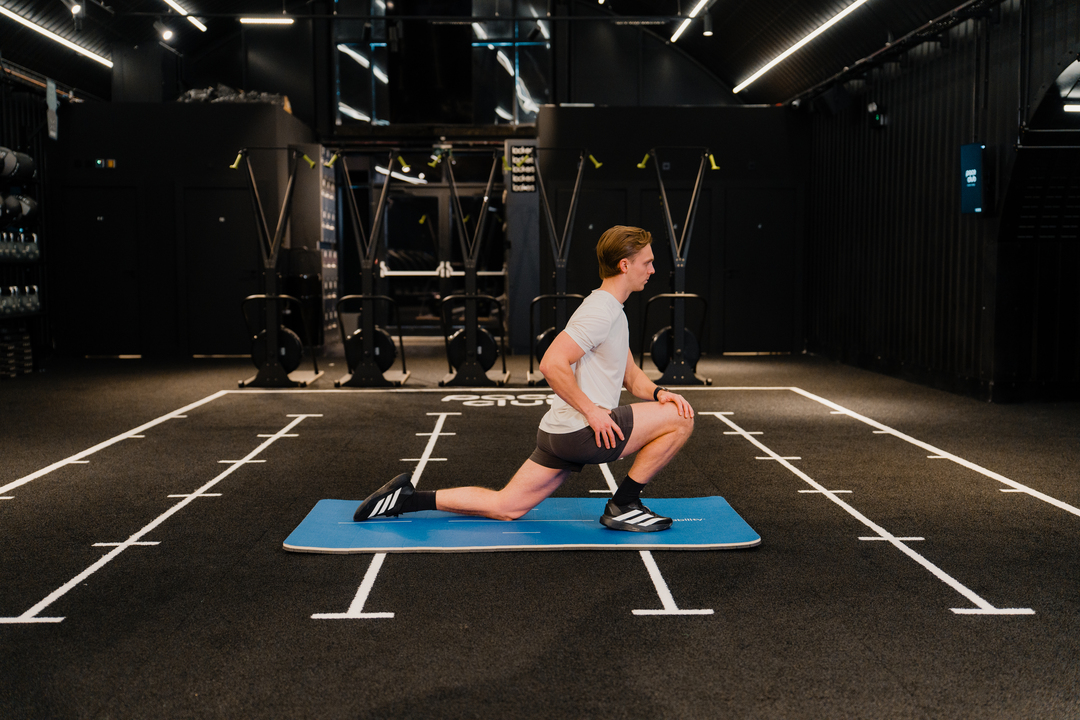Warehouse work is tough on the body. Workers often perform physically demanding tasks, such as lifting, pushing, pulling, and reaching, which can stress muscles and joints tremendously. Thankfully, stretching exercises for warehouse workers can help improve flexibility, reduce soreness, prevent injuries, and enhance overall performance on the job.
This guide will explore a variety of effective stretches to help those who work in warehouses and distribution centers feel better, work more efficiently, and stay safe on the job. We will touch upon seated stretches as well as outdoor stretches for the workers.
Pliability's mobility app is a valuable tool to help warehouse workers improve their flexibility, prevent injuries, and enhance their overall performance and comfort on the job. The app features a library of dynamic warm-up routines, cool-down stretches, and targeted recovery protocols to help you reach your goals.
Why is Stretching Important for Warehouse Workers?
.jpeg)
The Tough Truth About Warehouse Work and Its Impact on the Body
Warehouse work is no walk in the park. Lifting heavy objects, repetitive motions, and prolonged standing can take a toll on the body. Over time, these tasks can lead to serious injuries, chronic pain, and long-term disability. Stretching can help prevent injuries, improve flexibility, and reduce muscle fatigue.
Why Do We Experience Pain and Stiffness After Warehouse Work?
When we experience soreness after standing or physical work, it’s usually a sign that we’ve stressed our muscles. At first, they may grow more substantial, but they also need time to rest and recover. This process can be significantly pronounced if you’re new to a job and your body isn’t used to the demands of warehouse work. Typically, it takes one to three days for muscles to recover from physical stress. But if you continue to push your body without rest, you increase the risk of permanent damage and injury.
Warming Up Before You Work
Warming up before you work can help ease the pain that comes after—and the pain that lingers. With all the stress you place on your body from repetitive, everyday movements, the extra tension and loading on your body could even lead to some permanent damage. Even if you aren’t a heavy-lifter during the workday, you must warm up for work. To help you avoid lasting pain that could sideline you from your job, it’s important not only what you do during and after but also what you do before your shift. Just like a player preparing for practice, you’ve got to warm your body for the movements that lie ahead.
What Happens If We Don’t Take Action?
With lower back pain, if left untreated, you may develop stiffness and limited range of motion. For instance, you may be limited in your motion when bending forward. The pain may also spread if left untreated and extend into the legs. It may even come to a point where you can’t move and will have to stay in a particular pose not to feel the pain, which will take even longer to recover, making you take time off from work. With upper body overuse injuries, the pain may increase and make daily activities at home, such as doing the dishes or brushing my hair, difficult. If this happens when I hold or grab something repetitively, the wrists vibrate in pain, eventually traveling to my forearm and shoulders.
Relieving Pain After Warehouse Work
If you’re already experiencing pain, you can try to relieve some pain with Rest – Maybe take tomorrow off (if you can). Apply an ice pack over the area but not directly on the skin. Painkillers – panadol or ibuprofen ( not suggested using frequently ). Massage ( lightly massage the area ). Rest is the most important thing to do, and applying a stretch and warmup routine will help you avoid pain even better!
The Long-Term Benefits of Stretching Exercises for Warehouse Workers
If you’re more flexible and muscular, your body can easily handle daily tasks, so you can hit those KPI (key performance indicators) targets, pick-rate, etc. When we begin work, we must warm up our bodies and muscles to get blood flowing, move smoothly, and lessen the risk of injury.
What if we don’t take action?
With lower back pain, if left untreated, you may develop stiffness and limited range of motion. For instance, you may be limited in your motion when bending forward. The pain may also spread if left untreated and extend into the legs. It may even come to a point where you can’t move and will have to stay in a particular pose not to feel the pain, which will take even longer to recover, making you take time off from work.
With upper body overuse injuries, the pain may increase and make daily activities at home, such as doing the dishes or brushing your hair, difficult. If this happens when you hold or grab something repetitively, the wrists vibrate pain, eventually traveling to your forearm and shoulders.
If you have an on-site physiotherapist at your warehouse or don’t wish to let work know, you can always consult a physiotherapist outside of work. The faster you see a physiotherapist, the faster they will be able to help understand your situation and implement a plan to recover while possibly still being able to work. If the condition is serious, they may suggest you take some time off and focus on rehabilitation to ensure you are fit for work.
Disclaimer
if you are experiencing dizziness, double vision, trouble swallowing, or pins and needles down your back or legs, please immediately consult a physiotherapist or your local general practitioner.
Related Reading
- Why Is Employee Wellness Important
- How to Engage Employees in Wellness Programs
- Stretching Before Work
- Team Wellness at Work
- Benefits of Employee Wellness Programs
- Virtual Wellness Activities for Employees
- Benefits of a Workplace Wellness Program
- Benefits of Stretching at Work
- Staff Wellness Activities
- Employee Wellbeing Strategies
16 Quick Stretching Exercises for Warehouse Workers

1. Side Bend
Target Area
Torso and lower back
Benefits
A side bend is a great warm-up stretch to improve your range of motion along your torso and protect your lower back.
How to Do It
Start with your feet shoulder-width apart and your arms at your side. Start by raising your right arm overhead and leaning toward the left side. Repeat with your left arm overhead and lean toward the right side.
Duration
Hold your stretch on each side for 3-5 seconds. Repeat twice.
2. Neck Stretch
Target Area
Neck and vertebrae
Benefits
Neck stretches are designed to lengthen and relax the muscles and joints around your neck and vertebrae, which can lead to improved mobility and alignment.
How to Do It
Begin with your head facing forward. Turn your head slowly to one side so your chin is over your shoulder. Repeat this motion while slowly turning to the opposite side.
Duration
Repeat the stretch 5 times on each side.
3. Hamstring Stretch
Target Area
Hamstring tendons, hips, and pelvis
Benefits
The hamstrings consist of three muscles that run down the back of your thighs. Routinely performing a hamstring stretch helps improve your ability to bend and extend the joints around your knees and thighs.
How to Do It
Face forward and raise your foot on a boosted surface, at least a foot high. Slowly bend forward, stopping when you feel tension behind your thigh. Switch legs and repeat on the other side.
Duration
Hold the stretch for 3-5 seconds. Switch legs and repeat the stretch on each side twice.
4. Quadriceps Stretch
Target Area
Quadricep muscles and knees
Benefits
Holding this stretch can help loosen the muscles above the knee, increasing mobility and preventing knee injury.
How to Do It
Find a sturdy surface or wall you can hold onto for balance. Grab your left ankle with your right hand so your leg is bending behind you at the knee. Switch to the right side.
Duration
Hold this stretch for 3-5 sections, then repeat twice on each side of your body.
5. Shoulder Circles
Target Area
Shoulders, triceps, and biceps
Benefits
This simple stretch can help build muscle tone in your shoulders, triceps, and biceps to prevent injury.
How to Do It
This stretch can be done anywhere. All you have to do is stand up straight and slowly move your shoulders in a circular motion. Then, move them upward, downward, and backward to ensure you loosen each area of your shoulders.
Duration
Repeat these shoulder movements 5 times in each direction.
6. Chest and Shoulder Stretch
Target Areas
Chest muscles and shoulders
Benefits
A chest and shoulder stretch can help lengthen and loosen your chest muscles to improve the range of motion in your upper body.
How to Do It
Standing up straight, bend both elbows at a 90-degree angle with fingertips facing upward. Squeeze your shoulder blades together and hold.
Duration
Hold this stretch for 3-5 seconds, and repeat five times.
7. Wrist Stretch
Target Area
Wrist
Benefits
Stretching your wrist can improve flexibility around your hands and wrist to prevent injury while lifting objects.
How to Do It
Place your forearms horizontally, with both palms facing the floor. Bend both wrists downward so that fingertips are pointing toward the floor. Then, extend both of your wrists so your fingertips now face upward.
Duration
Repeat this motion five times.
8. Calf Stretch
Target Areas
Gastrocnemius and the soleus muscles (calf muscles)
Benefits
If you’re on a construction job, your calves are likely used daily by walking from place to place and participating in strenuous activities. A calf stretch can help prevent injury or aches around your calves, feet, and ankles.
How to Do It
Stand close to a wall with one foot in front of the other. Keep your front knee slightly bent. Place both hands on the wall in front of you, and with your back knee straight and heel on the ground, lean forward toward the wall. You should feel tension along the back of your calf.
Duration
Hold this stretch for 20-30 seconds, then repeat on the other side.
9. QL Stretch
Target Areas
Benefits
The QL is a deep core muscle that stabilizes your pelvis and lower back. Stretching this muscle can help improve mobility and relieve lower back pain.
How to Do It
Standing up, cross your left leg in front of the right. Reach your left arm above your head and lean your upper body and arm over to the right while simultaneously pushing your hips to the left.
Duration
Hold 20-30 seconds. Repeat on the other side.
10. Arms Above Head Stretch
Target Areas
Shoulders and upper back
Benefits
Stretching the upper body can help relieve tension that can build up from lifting, pushing, and pulling.
How to Do It
Bring arms above your head. Interlace your fingers and rotate so your palms face the ceiling. Stretch your palms up towards the ceiling.
Duration
Hold for 20-30 seconds.
11. Wrist Flexor Stretch
Target Area
Wrist flexor muscles
Benefits
Stretching the wrist flexor muscles can help improve flexibility and reduce the risk of strains and sprains.
How to Do It
Extend one arm out in front of you. Bend your wrist so your palm faces you and your fingers face down. Use your other arm to apply pressure at the back of your hand to intensify the stretch across the back of your wrist.
Duration
Hold for 20-30 seconds. Repeat on the other arm.
12. Wrist Extensor Stretch
Target Area
Wrist extensor muscles
Benefits
Stretching the wrist extensor muscles can help improve flexibility and reduce the risk of strains and sprains.
How to Do It
Extend one arm out in front of you. Bend your wrist so the back of your hand faces you and your fingers face up. Use your other hand to pressure your palm to intensify the stretch across your inner wrist.
Duration
Hold for 20-30 seconds. Repeat on the other arm.
13. Inchworm
Target Areas
Glutes, hamstrings, and calves
Benefits
This stretch targets multiple muscle groups in the posterior chain to improve flexibility and reduce the risk of injury.
How to Do It
Standing with your feet hip-width apart, bend forward until your palms touch the floor (or use a bed or low table if you cannot reach). When you’re ready, walk your hands out as far as you can in front of you while maintaining contact with the floor. Pause, then walk your hands back to your feet.
Duration
Repeat 2-3 times.
14. Figure 4
Target Areas
Glutes and hips
Benefits
This stretch targets the muscles of the hips and can help relieve the tightness resulting from repetitive lifting motions.
How to Do It
Starting on the floor, against a wall, or sitting upright, bend one leg at about a 45-degree angle. Cross the other leg, with your ankle resting on the thigh above the knee. If you can, reach behind the knee and pull toward you.
Duration
Hold for 20-30 seconds. Switch sides and repeat.
15. Angry Cat, Happy Cat
Target Areas
Back, shoulders, and chest
Benefits
This stretch targets the spine and can help improve mobility and relieve tension in the back.
How to Do It
On all fours, exhale and round out your spine—this is the angry cat. When you inhale, your tailbone and chest should be lifted—this is the happy cat.
Duration
Repeat 5 times.
16. Neck Flexion, Extension, and Rotation
Target Areas
Neck muscles
Benefits
Stretching the neck can help improve mobility and reduce the risk of injury.
How to Do It
Exaggerate the movement of your head as if you are nodding “yes” and shaking “no.”
Duration
Repeat 5 times in each direction.
Related Reading
- Workplace Stretching
- Wellness Incentive Programs
- Workplace Wellness Program Ideas
- Company Wellness Programs
- Successful Corporate Wellness Programs
- Employee Wellness Software
- Employee Wellness Program Ideas
- Corporate Wellness Initiatives
- Stretches For People Who Sit All Day
- Employee Wellbeing App
- Corporate Mobility Services
- Corporate Wellness Services
Tips for Successful Stretching
-min.jpeg)
Breathe Easy to Stretch Happy
Breathing steadily while stretching is crucial. Why? When you breathe steadily, you provide oxygen to your muscles. If you are depriving your muscles of oxygen, this could cause lactic acid build-up and pain. Studies also show that tension increases in your muscles and reduces when you inhale. It’s essential to exhale while stretching consistently to keep your muscles loose and relaxed.
Go Slow to Stretch Smart
Stretching your muscles slowly prevents them from overextending or being damaged. Moving too quickly could make your muscles strained or seriously injured. Take your time and ease into each stretch to allow your muscles to adjust.
Stretch Regularly for Better Results
Creating a consistent stretching routine is cost-effective for improving flexibility, alleviating tension or aching sensations, and reducing your long-term injury risk. Consider incorporating stretching into your daily routine or even perform stretches between tasks during the workday.
Listen to Your Body When Stretching
The most important rule of thumb when stretching is to listen to your body. If any stretch is causing pain or discomfort, discontinue or make modifications. When in doubt, check with your primary care provider to learn what works best for your body’s needs.
Improve Your Flexibility with Our Mobility App Today | Get 7 Days for Free on Any Platform
Pliability offers a fresh take on yoga tailored for performance-oriented individuals and athletes. Our app features a vast library of high-quality videos designed to improve flexibility, aid recovery, reduce pain, and enhance range of motion. Pliability provides daily-updated custom mobility programs for those interested in optimizing their health and fitness.
It also includes a unique body-scanning feature to pinpoint mobility issues. If you're feeling limited by pain or your ability to move, Pliability aims to complement your fitness routine and help you move better. Sign up today for 7 days absolutely for free on iPhone, iPad, Android, or our website to improve flexibility, aid recovery, reduce pain, and enhance range of motion with our mobility app.
Related Reading
- Best Corporate Wellness Software
- Companies With Employee Wellness Programs
- Office Chair Stretches
- Desk Exercises At Work
- Best Stretches For Office Workers
- Stretches For Warehouse Workers
- Corporate Wellness Companies
- Sprout Alternatives
- Calm Alternative








